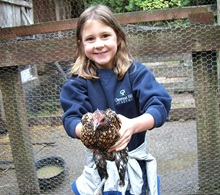 You’ve probably heard about the benefits of nature and outdoor play for children. According to the National Wildlife Federation, outdoor play boosts fitness and decreases the risk of childhood obesity; increases focus and academic achievement; and reduces stress and increases feelings of well-being.
You’ve probably heard about the benefits of nature and outdoor play for children. According to the National Wildlife Federation, outdoor play boosts fitness and decreases the risk of childhood obesity; increases focus and academic achievement; and reduces stress and increases feelings of well-being.
As a provider of quality childcare, we understand and agree with all these findings. While less tangible and quantifiable, the “fun” value of being outdoors can also be beneficial to children, particularly when they can share that fun with a beloved adult.
Conservationist Rachel Carson wrote, “If a child is to keep alive his inborn sense of wonder, he needs the companionship of at least one adult who can share it, rediscovering with him the joy, excitement, and mystery of the world we live in.” We think she’s onto something there. Below are a few simple outdoor activities for kids that we at Premier Academy think can help nurture a love of the natural world within your child.
Infants and Toddlers
Offer safe spaces for babies to crawl, walk, and explore, such as a variety of textured surfaces (e.g. grass, sand, or dirt). Point out and label birds, squirrels, insects and plants.
Toddlers are at a vantage point to observe things that we adults often miss. A simple walk around the neighborhood with the family can open a whole world to them if we simply slow down. We believe quality childcare starts with giving children the freedom to discover and explore! Make time to explore with toddlers, keeping in mind the journey, not the destination. How many plants and insects can you find? How many different textures or sensations can you discover?
Preschoolers
Offer your child a variety of natural and re-purposed materials, such as old metal pie tins, sticks, ribbon, wire, spoons, shells, or rocks. What can you make with these materials? How about wind chimes, a bird feeder, or an old-fashioned mud pie?
Speaking of old-fashioned fun, remember Winnie the Pooh and his game of “pooh sticks”? Gather several sticks of similar size and give each player a stick. On the count of three, drop the sticks from one side of a bridge. Run to the other side and watch for the sticks to float downstream. Which stick emerges first? Based on the natural world you see around you, improvise fun outdoor games for kids.
School-Agers
Get an up-close view of pond life. Cut the ends off a large cylindrical plastic container, such as a large food container or even a milk jug. Secure plastic wrap over one end with a rubber band or waterproof tape. Place the wrapped end of the container in a stream or pond. Look into the other end. The glare of the sun is diminished when looking through the container, so it’s easier to see plant and animal life in the water.
Grow something. School-age children are at an ideal age to learn about gardening. If you have the space, you can try easy-to-grow crops like lettuce, carrots, peas, and tomatoes in a full-size garden, a raised bed, or even pots. Try fast-growing flowers like pansies, nasturtiums, or sunflowers. How about a few herbs on the patio?
When asked why he felt optimistic that humans would find solutions to the environmental concerns plaguing our planet, physicist Freeman Dyson responded, “Because people will always love trees.” If children are removed from nature, though, will future generations develop this age-old wisdom? We believe at Premier Academy that experiencing nature with children through outdoor play has benefits today and for years to come as children become the stewards of our planet. So, get out there. Turn over a rock. Feel the breeze on your face. Get some dirt on your shoes.

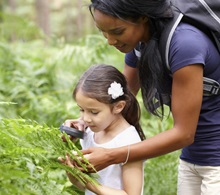 After a busy week of responsibilities, caring for children, and working in and out of the home, we cherish opportunities to be with family members. Shared quality time strengthens your family bond and helps everyone feel valued and respected. It is not necessary to make elaborate plans or partake in costly undertakings to enjoy family time.
After a busy week of responsibilities, caring for children, and working in and out of the home, we cherish opportunities to be with family members. Shared quality time strengthens your family bond and helps everyone feel valued and respected. It is not necessary to make elaborate plans or partake in costly undertakings to enjoy family time. One of the most common struggles parents have is dealing with picky eaters. Does any of this sound familiar to you?
One of the most common struggles parents have is dealing with picky eaters. Does any of this sound familiar to you? Mentoring is one of the oldest teaching methods in the world. Mentoring is really a personal coaching strategy where someone that has a specific skill or subject matter expertise works with another person to impart their knowledge in a very personal and connected way.
Mentoring is one of the oldest teaching methods in the world. Mentoring is really a personal coaching strategy where someone that has a specific skill or subject matter expertise works with another person to impart their knowledge in a very personal and connected way. One annual tradition in families around the world is to set goals, or resolutions, on New Year’s Eve. If you and your family celebrate this tradition it is a great opportunity to start to talk to your children about how to set goal that are going to help them to achieve their personal objectives in life.
One annual tradition in families around the world is to set goals, or resolutions, on New Year’s Eve. If you and your family celebrate this tradition it is a great opportunity to start to talk to your children about how to set goal that are going to help them to achieve their personal objectives in life.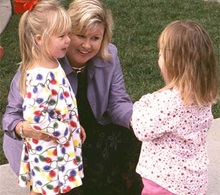 Whether you have a shy child or outgoing one, it can be challenging for children to make new friends and navigate social situations on their own. Though it’s not a good idea to manage every aspect of your children’s friendships or even bribe their peers to play with them, parents can provide opportunities and gentle coaching towards helping children make friends.
Whether you have a shy child or outgoing one, it can be challenging for children to make new friends and navigate social situations on their own. Though it’s not a good idea to manage every aspect of your children’s friendships or even bribe their peers to play with them, parents can provide opportunities and gentle coaching towards helping children make friends.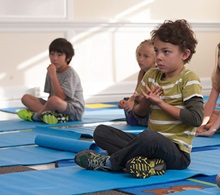 Few topics are as sensitive to talk about with children as weight and body image. How do we as parents contribute to positive body images in our children and teach healthy eating practices without making anyone feel guilty or bad? That can be a tall order. We know we need to start young and set the stage for healthy lifetime habits early. Before we even talk about the topic, however, we can model positive practices.
Few topics are as sensitive to talk about with children as weight and body image. How do we as parents contribute to positive body images in our children and teach healthy eating practices without making anyone feel guilty or bad? That can be a tall order. We know we need to start young and set the stage for healthy lifetime habits early. Before we even talk about the topic, however, we can model positive practices.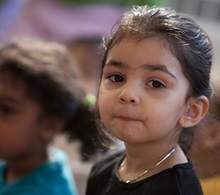 We live in a constantly changing world. The pace of change is the most rapid that it has ever been. New products and processes are continually available and the rate at which we are exposed to new information is continually increasing. This can be overwhelming at times. Sometimes we are able to shelter our children from so much change, but often not. If it is overwhelming to us, how does it feel to children? And that is just “normal” everyday change. What about the big unexpected changes?
We live in a constantly changing world. The pace of change is the most rapid that it has ever been. New products and processes are continually available and the rate at which we are exposed to new information is continually increasing. This can be overwhelming at times. Sometimes we are able to shelter our children from so much change, but often not. If it is overwhelming to us, how does it feel to children? And that is just “normal” everyday change. What about the big unexpected changes?